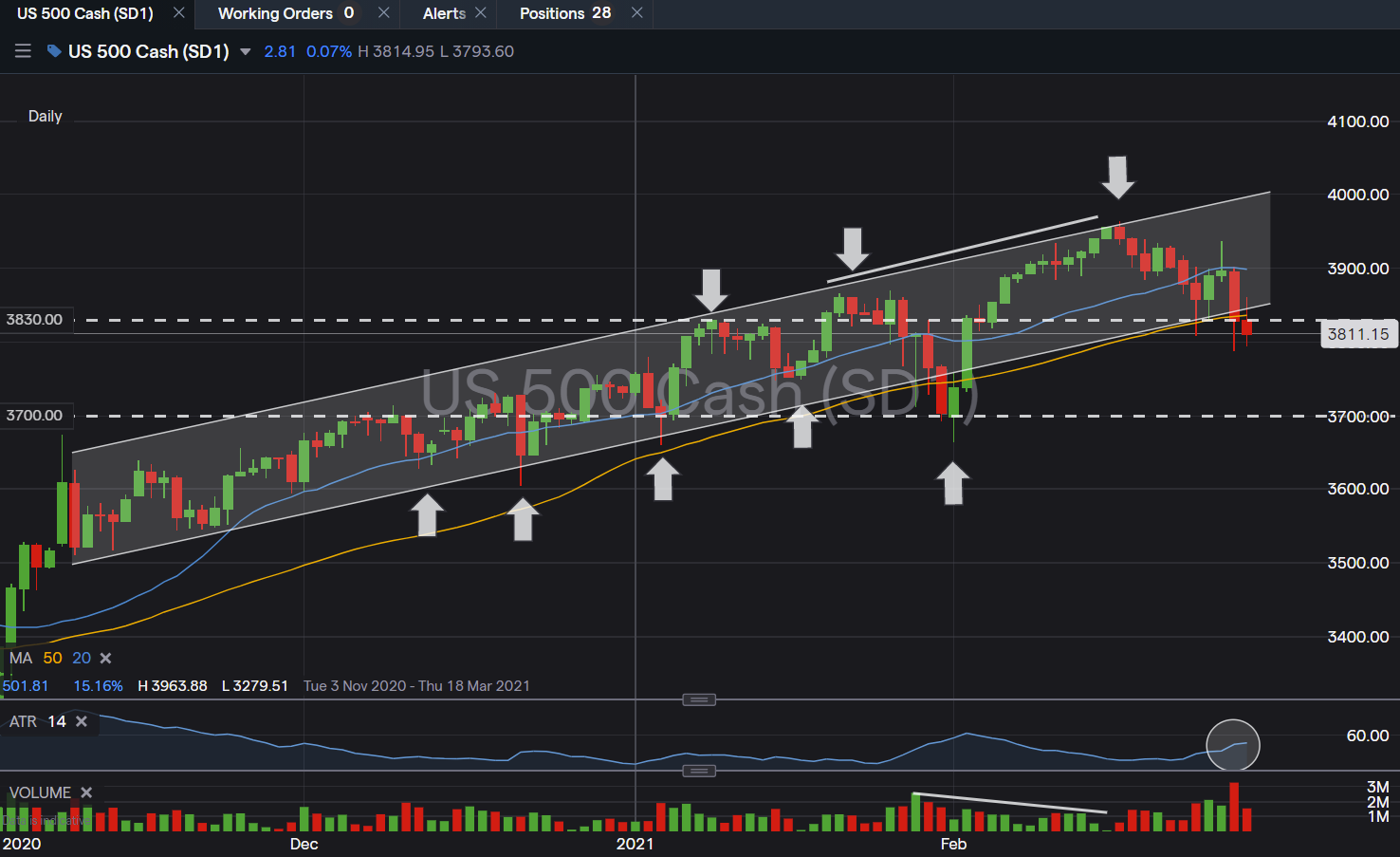Even after President Biden’s $1.9 trillion pandemic aid bill narrowly passed the House in the early hours of Saturday, the shakeup in stocks prompted by the rapid run up in Treasury yields looks set to continue to be a major focus for markets in the coming week. Investors will be focusing on Friday’s employment report, which is expected to show that virus restrictions kept a lid on jobs growth in February. Appearances by several Federal Reserve speakers, including Chairman Jerome Powell will also be closely watched. Meanwhile, earnings season is wrapping up, but retailers will still be reporting, with Target ($TGT), Kohl’s ($KSS) and Nordstrom ($JWN) due to publish figures on Tuesday, followed by Costco ($COST) on Thursday.
Here’s what you need to know to start your week.
S&P500 (US Market)
The S&P 500 Index ($SPX) remains in red for the week, furthering its correction by -2.37%. The selling of individual equities was most felt on two separate occasion; on Monday 22nd February ($SPX: -0.56%), and Thursday 25th February ($SPX: -2.60%).
It is important to note there were several technical structure being broken on the highlighted Thursday itself;
- Price Action breakdown on 20DMA (3rd Attempt in last 3 months)
- Price Action breakdown on 50DMA (2nd Attempt in last 2 months)
- Price Action breakdown on 4 months Trend Channel (2nd Attempt in last 4 months)
- Breakdown of immediate support at 3,870 with volume exceeding past 50 trading sessions average by +87%.
- Increasing implied volatility on the week of selloff.
On the flip side, every attempted breakdown on the confluence of above technical structure is accompanied with an immediate, and substantial recovery on $SPX (ie. 1st February to 5th February $SPX: +5.35%).
At the current junction, $SPX remains bullish at a higher low. Further signs of weakness in this correction will require $SPX to breach its next classical support level at 3,700, for the first significant lower low to be established since September 2020. It remains wise to capitalize on the potential investment opportunities with a prudent risk level.
Immediate resistance for $SPX is currently at 3,830, a support turned resistance level.
Tug of war between stocks, rising bond yields
The shift into energy, financial and other stocks set to benefit from the economic reopening has accelerated, while rapidly climbing Treasury yields are pressuring tech stocks that have led market gains for years.
Tech stocks are particularly sensitive to rising yields because their value rests heavily on future earnings, which are discounted more deeply when interest rates go up.
A dovish sounding Fed together with expectations for more stimulus have propelled yields higher and fueled concerns about inflation and the two-track market looks set to continue, at least in the short team.
February jobs report
With President Joe Biden’s $1.9 trillion coronavirus relief package advancing to the Senate Friday’s nonfarm payrolls report for February will show how the recovery in the labor market is faring.
Government data late last week showed that initial jobless claims unexpectedly declined to their lowest in three months, indicating that the slowing infection rate is allowing the labor market to gain some traction. Retail sales also rebounded in January.
Economists are expecting the U.S. economy to have created 165,000 new jobs in February, after January’s 49,000 increase. But the winter storms that swept across the South may complicate the picture.
Powell speech
With the rapid climb in Treasury yields roiling the stock market investors may be hoping for Fed officials to address the selloff in Treasuries.
Fed Chair Jerome Powell is set to speak about the economy at an online event hosted by the Wall Street Journal on Thursday. So far there has been little sign of anxiety among Fed officials about higher Treasury yields.
Last week Powell said the move higher was the result of a stronger economy but added that the rate of economic recovery has slowed in recent months and reiterated that monetary policy will remain easy for some time to come.



